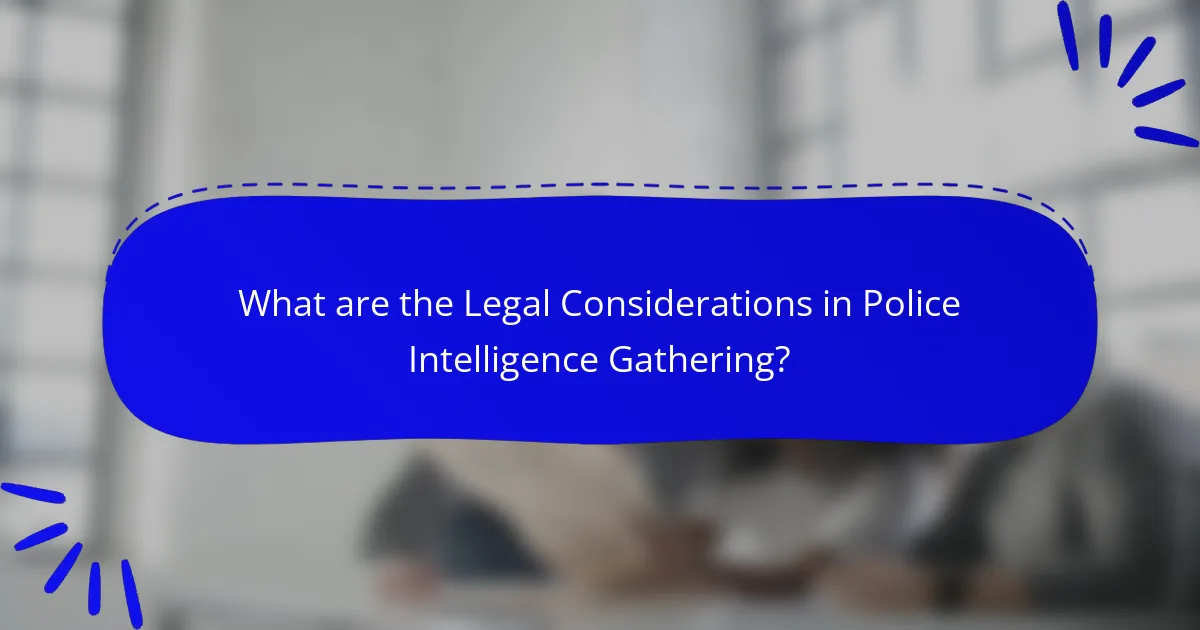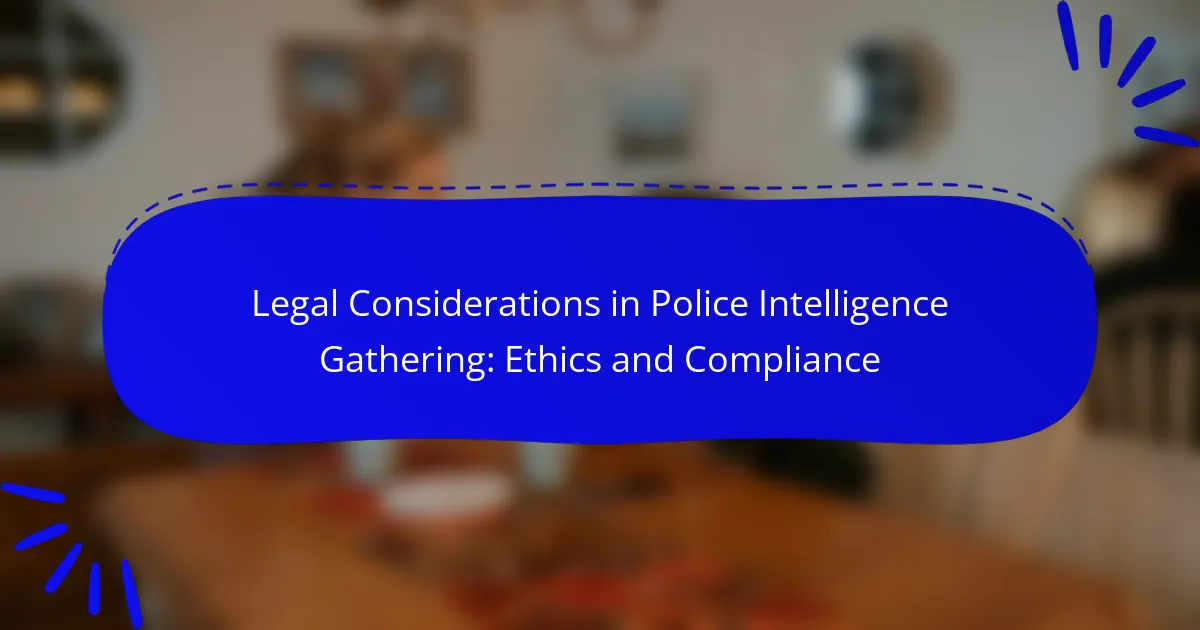
What are the Legal Considerations in Police Intelligence Gathering?
Legal considerations in police intelligence gathering include adherence to constitutional rights, privacy laws, and statutory regulations. Law enforcement agencies must respect the Fourth Amendment, which protects against unreasonable searches and seizures. They must obtain warrants based on probable cause for most surveillance activities. Additionally, agencies must comply with the Electronic Communications Privacy Act, which governs access to electronic communications. Violations can lead to evidence exclusion in court and civil liability. Courts have established precedents that guide legal boundaries in intelligence gathering. For instance, the Supreme Court ruling in Katz v. United States emphasized the expectation of privacy in public communications. These legal frameworks ensure accountability and protect citizens’ rights during intelligence operations.
How do laws influence police intelligence gathering practices?
Laws significantly influence police intelligence gathering practices by establishing legal frameworks that dictate acceptable methods and procedures. These laws, such as the Fourth Amendment in the U.S., protect citizens from unreasonable searches and seizures. Consequently, police must obtain warrants based on probable cause to gather intelligence through surveillance. Additionally, laws like the USA PATRIOT Act expand certain surveillance capabilities but also impose oversight requirements. Compliance with these laws is essential to ensure that intelligence gathering does not infringe on civil liberties. Failure to adhere to legal standards can result in evidence being deemed inadmissible in court, impacting investigations. Therefore, laws shape the boundaries within which police operate, guiding their intelligence practices while balancing public safety and individual rights.
What specific laws govern police intelligence activities?
The specific laws that govern police intelligence activities include the USA PATRIOT Act, the Foreign Intelligence Surveillance Act (FISA), and the Fourth Amendment of the U.S. Constitution. The USA PATRIOT Act enhances law enforcement’s ability to gather intelligence for national security purposes. FISA regulates the government’s surveillance activities on foreign powers and agents. The Fourth Amendment protects citizens from unreasonable searches and seizures, impacting how police conduct intelligence operations. These laws collectively establish the legal framework for police intelligence activities, ensuring a balance between security and civil liberties.
How do these laws vary by jurisdiction?
Laws regarding police intelligence gathering vary significantly by jurisdiction. Each state or country may have different statutes governing the collection and use of intelligence. For instance, some jurisdictions may require a warrant for surveillance, while others may allow warrantless collection under certain conditions. Privacy laws also differ; some places have stringent protections for personal data, while others are more lenient. Additionally, the use of technology in intelligence gathering, such as drones or [censured] recognition, is regulated differently across regions. These variations can lead to differing levels of accountability and oversight in police practices. Understanding these differences is crucial for ensuring compliance with local laws.
Why is ethics important in police intelligence gathering?
Ethics is crucial in police intelligence gathering to ensure the protection of civil liberties. Ethical practices build public trust and legitimacy in law enforcement. They prevent abuses of power and ensure accountability for police actions. Ethical guidelines help officers navigate complex situations while respecting legal frameworks. Studies show that ethical behavior in policing reduces incidents of misconduct. For example, the International Association of Chiefs of Police emphasizes integrity as a core value. Ethical intelligence gathering fosters community cooperation and supports effective crime prevention. Ultimately, ethics safeguard the principles of justice and fairness in society.
What ethical principles should guide police intelligence operations?
Ethical principles guiding police intelligence operations include transparency, accountability, and respect for privacy. Transparency ensures that police actions are open to scrutiny. Accountability holds officers responsible for their decisions and actions. Respect for privacy safeguards individual rights during intelligence gathering. These principles promote public trust and prevent abuse of power. Studies indicate that adherence to these ethical standards improves community relations and enhances the effectiveness of police work. For instance, the International Association of Chiefs of Police emphasizes the importance of ethical conduct in law enforcement practices.
How do ethical considerations impact public trust in law enforcement?
Ethical considerations significantly impact public trust in law enforcement. When law enforcement agencies uphold ethical standards, they foster transparency and accountability. This leads to increased community confidence in their operations. Conversely, unethical practices can erode public trust and create skepticism. Research shows that communities perceive police actions as legitimate when ethical guidelines are followed. A study by Tyler and Huo (2002) indicates that perceived fairness in police conduct enhances public trust. Additionally, ethical lapses, such as misconduct or discrimination, can lead to public outrage and diminished trust. Thus, ethical considerations are crucial for maintaining and building trust between law enforcement and the community.
What are the compliance requirements for police intelligence gathering?
Compliance requirements for police intelligence gathering include adherence to legal frameworks, policy guidelines, and ethical standards. Law enforcement agencies must follow constitutional provisions, such as the Fourth Amendment, which protects against unreasonable searches and seizures. Additionally, they must comply with state laws governing surveillance and data collection. Agencies should establish clear protocols for obtaining warrants when necessary.
Training for personnel on legal and ethical standards is essential. This ensures that intelligence gathering respects privacy rights. Regular audits and oversight mechanisms help maintain compliance. These measures protect both the integrity of investigations and the rights of individuals.
Failure to comply can result in evidence being deemed inadmissible in court. It may also lead to legal repercussions for the agency involved. Thus, adherence to compliance requirements is crucial for lawful intelligence gathering.
What role do oversight bodies play in ensuring compliance?
Oversight bodies play a crucial role in ensuring compliance with laws and regulations. They monitor law enforcement agencies to ensure adherence to legal standards. These bodies conduct audits and reviews to assess compliance levels. They also investigate complaints and allegations of misconduct. Oversight bodies provide recommendations for policy improvements. They promote transparency and accountability within police practices. Research shows that effective oversight reduces instances of abuse and enhances public trust. For example, the National Police Accountability Project highlights the importance of oversight in improving police accountability.
How can police departments ensure adherence to compliance standards?
Police departments can ensure adherence to compliance standards by implementing clear policies and training programs. These policies should outline the legal requirements and ethical guidelines for intelligence gathering. Regular training sessions can help officers understand these standards and their importance.
Additionally, police departments should conduct periodic audits to assess compliance with established policies. These audits can identify areas for improvement and ensure accountability. Establishing a dedicated compliance officer can provide oversight and guidance on adherence to standards.
Furthermore, fostering a culture of transparency and accountability within the department encourages ethical behavior. Engaging with community stakeholders can also enhance trust and ensure that compliance standards reflect community values.
How do legal considerations affect the effectiveness of police intelligence?
Legal considerations significantly impact the effectiveness of police intelligence. They dictate how information is collected, shared, and used. Compliance with laws ensures that intelligence is admissible in court. Violations can lead to evidence being excluded, weakening cases. Legal frameworks also protect citizens’ rights, fostering public trust. Trust enhances cooperation between law enforcement and communities. Additionally, clear legal guidelines reduce the risk of abuse of power. This balance is crucial for effective policing and community safety.
What challenges do police face in balancing legality and effectiveness?
Police face significant challenges in balancing legality and effectiveness. Legal constraints can limit police actions in critical situations. For instance, strict adherence to search and seizure laws may hinder timely evidence collection. Effectiveness often requires rapid responses that may conflict with legal protocols. Additionally, public scrutiny and accountability pressures can lead to hesitation in decision-making. Police must navigate community expectations while ensuring compliance with laws. The tension between upholding civil rights and achieving operational goals creates ongoing dilemmas. Studies indicate that excessive legal caution can lead to missed opportunities in crime prevention. Balancing these aspects is crucial for maintaining public trust and ensuring safety.
How can police mitigate risks associated with legal challenges?
Police can mitigate risks associated with legal challenges through comprehensive training and policy development. Establishing clear protocols helps ensure compliance with laws and regulations. Regular training on legal standards empowers officers to make informed decisions. Documenting interactions and decisions provides a transparent record for accountability. Engaging in community outreach fosters trust and cooperation with the public. Utilizing legal counsel during investigations can prevent missteps. Conducting regular audits of practices identifies potential legal vulnerabilities. These measures collectively reduce the likelihood of legal challenges and enhance operational integrity.
What best practices can enhance legal compliance in intelligence gathering?
Implementing robust training programs enhances legal compliance in intelligence gathering. Training ensures that personnel understand legal frameworks and ethical standards. Regular updates on laws and regulations are essential. Documenting all intelligence-gathering activities provides transparency and accountability. Utilizing technology that complies with privacy laws minimizes legal risks. Engaging legal counsel during intelligence operations helps identify compliance issues early. Conducting audits of intelligence practices can uncover potential legal violations. Establishing clear policies and procedures reinforces adherence to legal standards.
What are the implications of non-compliance in police intelligence gathering?
Non-compliance in police intelligence gathering can lead to significant legal and operational consequences. It may result in the exclusion of evidence obtained unlawfully in court. This exclusion can weaken cases against suspects. Additionally, non-compliance can lead to disciplinary actions against officers involved. Legal challenges may arise from affected individuals, resulting in costly settlements. Public trust in law enforcement can diminish due to perceived misconduct. Furthermore, non-compliance may hinder effective intelligence sharing among agencies. The overall effectiveness of policing strategies can be compromised, impacting community safety.
What legal consequences can arise from non-compliance?
Legal consequences of non-compliance can include fines, penalties, and civil liability. Organizations may face significant monetary fines for failing to adhere to laws and regulations. In some cases, non-compliance can result in criminal charges against individuals involved. Additionally, non-compliance may lead to loss of licenses or permits necessary for operation. Courts may impose injunctions to prevent further violations. Affected parties may also pursue civil lawsuits for damages caused by non-compliance. These consequences emphasize the importance of adhering to legal standards in police intelligence gathering.
How can non-compliance affect community relations and public perception?
Non-compliance can severely damage community relations and public perception. When law enforcement agencies fail to adhere to legal and ethical standards, trust diminishes. This erosion of trust can lead to increased public scrutiny and criticism. Communities may feel alienated or targeted, resulting in strained interactions. Negative media coverage often amplifies these perceptions, portraying the agency unfavorably. Research indicates that transparency and accountability are critical for maintaining public trust. For example, a study by Tyler and Huo (2002) found that perceived legitimacy influences cooperation with police. Therefore, non-compliance not only impacts immediate relations but can have long-lasting effects on community engagement and support.
What practical tips can police departments follow to ensure ethical and legal intelligence gathering?
Police departments can ensure ethical and legal intelligence gathering by implementing clear policies and training. Establishing comprehensive guidelines helps officers understand legal boundaries. Regular training sessions on constitutional rights and privacy laws are essential. Officers should document all intelligence-gathering activities meticulously. This documentation provides transparency and accountability. Engaging with community stakeholders fosters trust and collaboration. Departments should also utilize oversight mechanisms to review intelligence practices. Independent audits can identify potential ethical violations and improve compliance. By prioritizing ethics, police departments enhance their credibility and effectiveness in intelligence gathering.
Legal considerations in police intelligence gathering encompass adherence to constitutional rights, privacy laws, and statutory regulations that govern law enforcement practices. Key laws such as the Fourth Amendment, the USA PATRIOT Act, and the Foreign Intelligence Surveillance Act (FISA) establish the legal framework for obtaining intelligence while protecting citizens’ rights. The article examines the influence of these laws on police practices, the ethical principles that guide intelligence operations, and the compliance requirements necessary for maintaining accountability. Additionally, it addresses the implications of non-compliance, the role of oversight bodies, and best practices for ensuring ethical and legal intelligence gathering.
